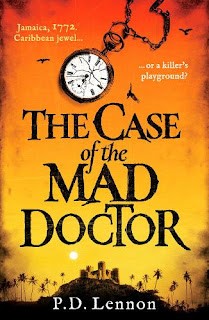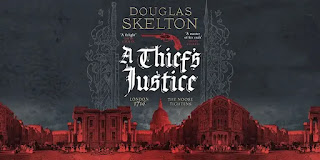As a crime fiction writer, this was a real “Whoa!”
moment. This piece of Jamaican legend had managed to evade me. How? I do not
know. I re-read page 47 about five times, intrigued by the knowledge that in or
around 1760, a Scotsman sailed silvery blue oceans to the tropical climes of Jamaica
for a new life and brought violence. He could have brought tartan, a few kilts
or shawls to show off, but no. True, a great majority of Europeans also came to
kill, but they had navies and the blessing of queen or king and country. Scottish
immigrant Doctor Lewis Hutchinson had no navy, just cruel intent and
ammunition. Bows, arrows, muskets and plenty of lead balls.
For years, I delayed writing about Doctor Hutchinson (referred
to as ‘Hutchison’ in some journals) because information about his early life is
quite scant. Believed to be born in the year 1732, he was twenty-eight when he
left Scotland for Jamaica. Where he obtained medical training is unknown. His
name is nowhere to be found in the register of Edinburgh physicians, nor was he
a student or graduate of Edinburgh Medical School. Where he lived in Scotland
or what informed his decision to leave that country is also a mystery.
Although Hutchinson’s infamy is rooted in Jamaican
crimes, I do wonder if he was always a brutish fellow who fled Scotland to
avoid law enforcers. He settled in Pedro, St Ann, a tiny remote district on the
island and built a home boldly titled Edinburgh Castle. Before long he was
accused of stealing cattle to start a cattle business - the first sign of his
descent into lawlessness. His encore was to launch a vicious assault upon his
neighbour, Dr Jonathan Hutton, of such severity that the victim returned to
England for a trepanning operation. This was a mere taster of what Hutchinson
could do. A lot more evil was concealed up his ruffled cuff sleeves.
Somehow, someway, this mysterious character belonged
in a story. What I had to do was work out a structure, and that evaded me for
some time until I saw an article about a book called Black Tudors. I liked the
idea of gainfully employed Black people in King Henry VIII’s time and wanted to
write about a clever Black man. After all, literature has to find space for a
different type of hero. They can’t all be Tom Holland lookalikes. King Henry’s Tudor
era was sixteenth century. Doctor Hutchinson’s reign of terror came much later in
the Georgian era. A light bulb went off. I decided that my tale would be about
a smart Black Georgian, a fictional hero to take down the Mad Doctor. Originally
entitled The Adventures Of Isaiah Ollenu, it was later changed to The Case of the Mad Doctor in consultation with my astute editor, Craig Lye.
The desolate district of Pedro would have been too
restrictive as a setting for the entire book. Instead, much of the island is on
show. Spanish Town (St Jago de la Vega), St Catherine, was the capital city and
features prominently throughout. A few of the imposing buildings from that era
still exist in Spanish Town square, some as ruins, others as local government
facilities. The populous and popular Kingston gets a look in too, as does
Montego Bay where a magnificent ball is held. Determined to include Jamaican
folklore - as not many books do - I added elements of magical realism in the
tale, including African mermaids and a rolling calf. Yes, Jamaica’s most
terrifying four-legged duppy gets a whole scene to run riot.
Despair can be a close companion when conducting
research into what was a barbarous time for people in Africa, the West Indies
and the Americas, but creating art through pain is something that writers of
dark fiction must get used to.
In the colonial era, unimaginable cruelty was
inflicted upon human beings, enslaved and forced to work in degrading
conditions to ensure Europe grew wealthy. Doctor Hutchinson ran a sugar
plantation and owned enslaved Africans. While we do not know much about their
lives, they deserve a voice and were given one.
Combining fiction with dark fact to produce
entertainment is a delicate task. Early on, I realised that the only way to write
the tale without falling into depression was to include a good dose of humour,
which tone is set from chapter one. Whether you chose to root for the good guys
or the bad guy, I hope you savour the antics of the very different characters.
The Case of the Mad Doctor by P D Lennon (Canelo Press)
Out Now.
Inspired by the true story of Jamaica’s first serial killer. Jamaica, 1772. Caribbean jewel, or a killer's playground? On the island of Jamaica, people have started disappearing without trace. Have they run away, trying to start new lives in the British colony under assumed names, or is something darker afoot? Some of the missing had taken out large life insurance policies before leaving England, and so word of the vanishings reaches Bristol when relatives try to collect their pay outs. With suspicion of a grand fraud in the air, ambitious Black barrister’s clerk Isaiah Ollenu is thrown together with pious insurance agent Ruben Ashby and ordered to the Caribbean to investigate. But, confronted by prejudice, untoward characters and vengeful spirits, the task may cost this unlikely duo more than either man is willing to pay…
*Kei Miller - The Cartographer Tries to
Map a Way to Zion, Carcanet Press.









%20(1)%20(1).jpg)


















